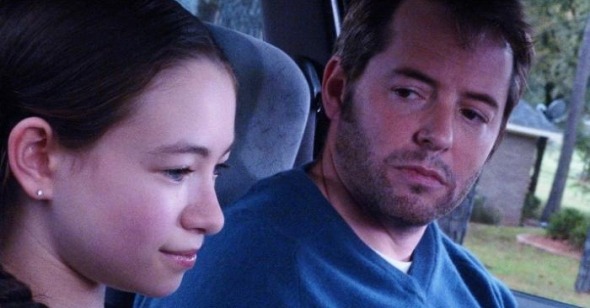Who’s the Man
By Chris Wisniewski
Wonderful World
Dir. Joshua Goldin, U.S., Magnolia Pictures
Here's the good news: Michael K. Williams, who played Omar on The Wire, is in Wonderful World, the debut film by writer-director Joshua Goldin. The bad news? He spends most of the movie in a diabetic coma. So we’re pretty much stuck with Matthew Broderick's Ben, a former children's musician turned sullen, whiny, grumpy, and dumpy copy editor. Self-righteously rejecting anything resembling ambition—“at least I don’t delude myself with hopes and dreams,” he scoffs—Ben shares a small apartment with Ibou (Williams), a salt-of-the-earth Senegalese immigrant who pontificates about game theory over evening chess matches. Though it's hard to believe any woman would have married him in the first place, Ben is once divorced and has a confused, vaguely sad adolescent daughter (Jodelle Ferland) who doesn't much appreciate his company—and why would she? He barely shows any interest in her (when she confesses that she thinks she might be a lesbian—a plot point Goldin promptly drops—Ben basically changes the subject). Fortunately for her, she mostly avoids spending time with him; if only we were so lucky. Goldin's built his film around an unremittingly unlikable protagonist, and though he acquits himself with a certain degree of aplomb behind the camera, the character's relentless cynicism cripples the movie.
It's hard to know how Goldin wants us to respond to Ben. While the movie charts his unlikely journey towards serenity, if not redemption, Broderick and Goldin play his screeds against corporate greed and rampant selfishness earnestly: Ben complains endlessly about The Man and even gets a chance, in a few fantasy sequences, to spar with said Man (embodied by an ineffectual Philip Baker Hall). Ben has the vitriolic petulance of an overgrown 16-year-old. That may be the point, but rather than critiquing his tendency to wallow in a perpetual adolescence, Goldin seems to sympathize, or even valorize it. Whatever he lacks in charm—and his deficiencies in that department are quite pronounced, indeed—Ben is usually in the right, a misguided idealist fighting the good fight against the greedy money-grubbers and soulless bureaucrats who oppress through indifference.
After Ibou slips into his coma, Ben rushes to his car so he can take his friend to the hospital, only to find that it's being towed. He pleads for help from the tow truck driver, who responds with an unlikely rebuke, "You should have thought about that before you parked!" He eventually gets Ibou to the hospital and arrives to work four hours late. This small and perfectly reasonable lapse gets him promptly fired (apparently, his copy editing skills are so indispensable that his tardiness cost his employers a $10 million account). Friendless and unemployed, Ben decides to sue the city of Los Angeles to prove a point about the pervasive callousness that jeopardized the life of his roommate.
Things pick up when Ibou's sister, Khadi (Sanaa Lathan), arrives to care for her brother in the hospital. She moves into the apartment and strikes a vaguely flirtatious rapport with Ben. Lathan's a beautiful and warm screen presence, and if her eventual romantic interest in Ben strains credulity, it gives Goldin the opportunity to temper the negativity. Khadi cooks, shops, and, in the movie's most winning sequence, teaches Ben's daughter to perform a Senegalese dance during a sleepover. The subplot plays out predictably, but Lathan and Broderick have an endearing ease with one another. He plays his music for her (written for the film by indie children's musician Dan Zanes), and she sees the artist in him. Sex—and a thaw in Ben's attitude—is certain to follow.
The film falls out of its second-act groove with a disastrous misunderstanding, expected tragedy, and a late detour to Senegal featuring a Magnolia-esque metaphoric twist (raining fishes!). The movie's third act encapsulates everything that's wrong with Goldin's screenplay: Wonderful World goes exactly where we think it's headed from the very beginning in the most unconvincing way possible, one tone-shifting contrivance after another. Goldin's plotting is clumsy, his flights of fancy uninspiring and uninspired. Despite this, he gets some nice performances out of his actors and keeps the movie clipping along efficiently. It's perhaps damning with faint praise, but Wonderful World is never less than watchable, and by the standards of contemporary American independent film, that's actually saying something. Goldin's off to an inauspicious start as a screenwriter; fortunately, he shows a little more promise as a filmmaker.
